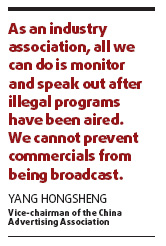|

Beijing police officers go through fake order sheets confiscated from suspected TV informercial cheats on Nov 26. More than 80 suspects were arrested last month in the capital's Fangshan district as part of an anti-deception campaign targeted at TV advertisers by local police. [China Daily] 
|
A joint notice from several administrations banned the use of television and radio infomercials to promote medicine or medical devices, as well as products that promised weight loss, height gain or larger breasts, from Aug 1 last year. But many Chinese channels continued to carry direct-response advertisements for such products after the deadline, resulting in the authorities issuing warnings to 12 stations.
Officials for the administration estimated the ban impacted almost half of all direct television shopping programs, but insisted it was in the best interests of the industry in the long term.
A mature market where quality can be ensured will help promoters to make more profits, officials said.
Infomercials are currently classed as television "shows", which means they are not required to meet the nation's advertising standards. However, that will be rectified from Jan 1 next year, according to a second notice by the administration on Sept 21.
Experts said the move would mean infomercials are vetted before being syndicated across China or sold to satellite stations, like those based in Beijing, Tianjin and Chongqing.
Direct-response advertisements were also banned from news channels and international channels, such as CCTV 9, and cannot be shown on satellite channels between 6 pm and midnight. Products deemed unsuitable for minors, such as breast-enlargement supplements, can also no longer be broadcast on channels aimed at children.
Gong Zhiwei, a Beijing-based advertising agent in his 30s, works with dozens of provincial television stations. He said his clients often run commercials, phone lines and distribution offices in three different cities, making them hard to trace.
Companies simply "skip town" and start somewhere else under a new name if their advertisements are pulled because of too many complaints, he added.
To combat this, the authorities have tightened the rules governing advertisers. Before airing a commercial, stations are now required to check promotion firms have fixed head offices where they can be traced, as well as registered capital of at least 10 million yuan.
Television companies are encouraged to shun advertisers that have been found guilty of fraud by the monitoring authorities in the past three years.
"All our clients must show us their licenses first," said Zhang Hao, a manager with CCTV Home Shopping. "Before any infomercial is broadcast on our channel, our staff also checks the content and script. No false information or exaggerated lines are tolerated."
Following the Sept 21 notice, several stations scrapped all direct-response advertising. A Zhejiang TV employee told China Daily the station has stopped running the commercials "even though it has cost us a lot of money".

But infomercials have not disappeared entirely and many still litter the schedules, promoting hair-loss creams and cell phones, which are usually pirated copies of well-known brands like Nokia, Apple and Motorola.
The China Advertising Association publicly condemned 58 illegal infomercials on Sept 25 after an investigation by the State Administration of Industry and Commerce.
It was the fifth time the association has spoken out against bad advertising since 2006. But "as an industry association, all we can do is monitor and speak out after illegal programs have been aired", said Yang Hongsheng, vice-chairman of the association. "We cannot prevent commercials from being broadcast in the first place."
Most of the programs mentioned in the latest notice were for products hosts claimed could cure illness, help people lose weight or remove scars. None of the advertisers were punished, despite the Law on Advertising stating that violators should face heavy fines.

